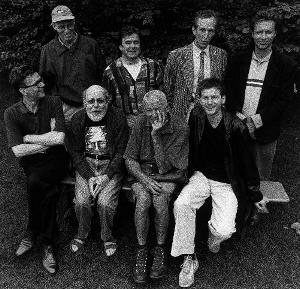|
MISHA
MENGELBERG
Misha
Mengelberg (Kiev, 1935) studiò composizione al Royal Conservatory
de l'Aia. Come improvvisatore, Mengelberg subì le influenze della
musica di Thelonious Monk e Herbie Nichols. Nei primi anni '60 prese parte
ad eventi teatrali musicali, ispirato dal movimento Fluxus. Dal '64 diresse
l'ormai leggendario quartetto con Piet Noordijk e Han Bennink, che si esibì
al Newport Jazz Festival. Nel 1967 Mengelberg, Bennink e Willem Breuker
fondarono l'Instant Composer Pool (ICP) e partirono organizzando progetti,
e realizzando la prima etichetta d'Europa completamente dedita alla musica
improvvisata. Quando Breuker lasciò la ICP nel '73, Mengelberg e
Bennink continuarono. Alla guida della ICP, che diresse in varie formazioni,
Mengelberg produsse opere teatrali musicali. A parte i lavori originali,
negli anni più recenti l'omaggio che la ICP Orchestra offre all'approccio
musicale di Mengelberg è caratterizzato da una straordinaria tensione
tra l'atteggiamento formale del compositore, una cieca avversione per la
mentalità "servile" della maggior parte dei gruppi, ed un'avventurosa,
satirica posizione, non solo nei confronti della tradizione jazz americana,
ma anche della musica folk europea e della pomposità del fare musica
"seria".
English
Misha
Mengelberg was born in Kiev in 1935 - the son of a Dutch composer/conductor/pianist
and a German harpist - but is a lifelong resident of Amsterdam, where he
teaches counterpoint at the Sweelinck Coservatory. He wrote his first piece
for piano at age four and has been composing pretty much ever since, in
the jazz and classical fields. Crucial early influences include jazz pianists
Thelonious Monk and Herbie Nichols, the composer John Cage, whom he heard
lecture at Darmstadt in 1958, and the absurd-art movement Fluxus, with
which he was involved in the 1960s.
Mengelberg
graduated from the Royal Conservatory in the Hague in 1964. The same year
he made his first issued recording, Eric Dolphy's "Last Date". That album
also features drummer Han Bennink, with whom Misha has had a longstanding
duo. In 1966 Mengelberg's quartet appeared at the Newport Jazz Festival
in the USA. The following year Mengelberg, Bennink and Willem Breuker founded
the Instant Composer Pool, a landmark in the development of the independent
Dutch improvised music, which draws on jazz but does not restrict itself
to any one style or esthetic (by the time of its 30th anniversary
in 1997, ICP Records was the longest-running musician-owned label in improvised
music). In the same period he wrote several "game pieces" for musicians,
notably "Hello! Windyboys" (1968), over a decade before such gaming became
common.
In the
1970s Mengelberg was artistic director of the electronic music workshop
STEIM (Studio for Electro-Instrumental Music), served as first chairman
of the Dutch improvising musicians' union BIM, and began leading the Instant
Composers Pool Orchestra. He also recorded in trios with Bennink and either
South African saxophonist Dudu Pukwana or German reed player Peter Brötzmann,
and in duet with is wife's parrot Eeko. Along with Breuker, Mengelberg
is largely responsible for the creation of Dutch "music theater", which
contains heavy doses of absurdity and improvisation, musical and theatrical.
In the
'80s Mengelberg presented many music theater productions and embarked on
repertory projects exploring the music of Herbie Nichols, Thelonious Monk
and Duke Ellington, with ICP (documented on their CDs "Two Programs - the
ICP Orchestra Performs Nichols-Monk" and "Bospaadje Konijnehol I", both
on the ICP label) and in quintets with Bennink and saxophonist Steve Lacy,
heard on the albums "Regeneration" and "Change of season" (Soul Note).
His recordings in the '90s include two acclaimed trio CDs taped in New
York with drummer Joey Baron, "Who's Bridge" (Avant) and "No Idea" (DIW);
the solo piano recital "Mix" (ICP) and a duo recording with Bennink, "MiHa"
(both on ICP), and "Jubilee Varia", a 1997 recording by the ICP Orchestra
(hatOLOGY). He also participated with improvised meetings with various
European and American musicians, for several labels.
Mengelberg's
many compositions for reading musicians include "3 Pianopieces" (1961)
and "In Memorium Hans van Zweeden" (1964 - early minimalism, from his Fluxus
years) for solo piano, "Dressoir" (1977) for the wind Orchestra De Volharding,
"Rokus de Veldmuis" for the electro-acoustic ensemble Hoketus (1983), and
"To a Deaf Man's Ears", a 1996 cantata scripted by Dutch write J.Bernief.
His orchestral compositions include "With Well-Kind Regards from the Camel"
(1974), "3 Intermezzi" (1981), "Zeekip Ahoy" (1984) and "Beestebeest versus
Hertie" (1995). "Onderwg" (1973) and his 1980 saxophone concerto (played
by Ed Boogaard) can be heard on the CD "Misha Mengelberg" (Pierrot Lunaire/Associazione
di Idee) recorded by the Orchestra del Teatro Comunale di Bologna, cond.
Ernst van Tiel.
Mengelberg
continues to lead the ICP Orchestra, usually an octet with German trumpeter
Thomas Heberer, and the cream of musicians based in Hollad: drummer Bennink,
reedists Ab Baars and Michael Moore, trombonist Wolter Wierbos, cellist
Tristan Honsinger and bassist Ernst Glerum. That band serves as a forum
for all Mengelberg's interests: composition, improvisation, conducted improvisation,
and music theater.
|

